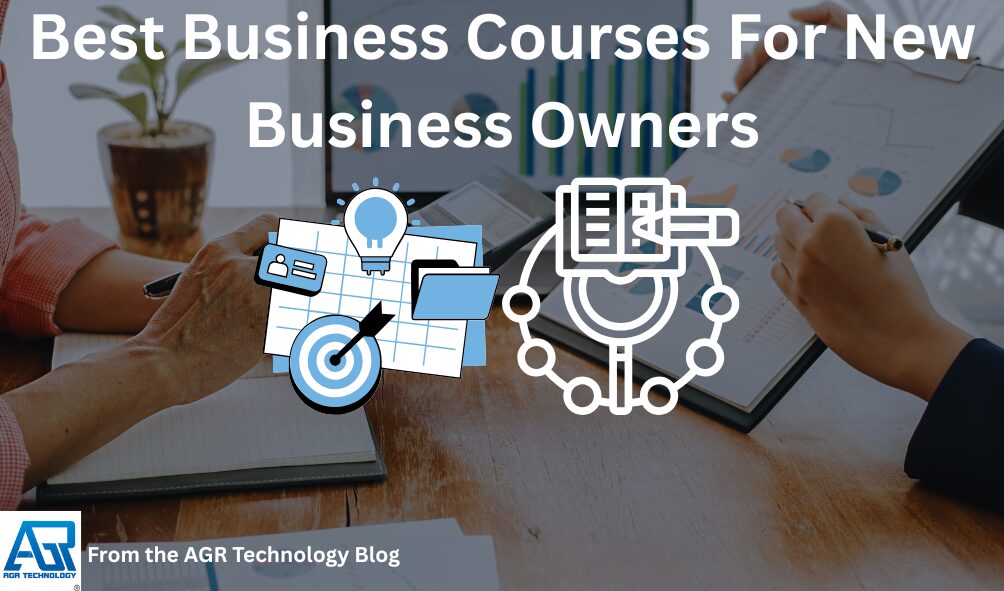Business skills have become essential for career advancement across industries. Whether someone’s aiming to climb the corporate ladder or launch their own venture, the right business education can make all the difference. Today’s professionals need expertise in areas like data analysis, strategic planning, and digital marketing to stay competitive.
The demand for business knowledge has led to an explosion of online learning opportunities. From foundational courses in accounting and finance to specialized programs in project management and entrepreneurship, there’s a path for every career goal. Professional certificates and MBA programs now offer flexible ways to gain credentials that employers value.
Finding the best business courses means matching learning objectives with career aspirations. Some professionals seek comprehensive MBA programs while others need targeted skills in areas like business analysis or supply chain management. The most effective courses combine practical applications with theoretical knowledge to prepare learners for real-world challenges.
Top Business Courses for New Entrepreneurs in February 2026
Building on the essential business skills outlined earlier, professionals need targeted courses that align with their career advancement goals. The right business course can transform theoretical knowledge into practical expertise that employers value. Here’s a curated selection of courses designed to accelerate professional growth across different business disciplines.
1) Coursera

Coursera is a leading online learning platform that offers a wide range of business courses designed to equip learners with practical knowledge and skills for success in the modern professional landscape. It partners with renowned universities and industry giants to deliver top-notch educational content, making it accessible to many courses from prestigious institutions like Yale, the University of Michigan, and Princeton. Coursera’s flexible learning structure allows learners to learn at their own pace, whether they’re juggling work or other commitments.
Some popular courses include “Business Strategy” by the University of Virginia, “Digital Marketing Specialization” by the University of Illinois, and “Financial Markets” by Yale University. These courses provide theoretical frameworks and practical applications, making them ideal for professionals looking to stay competitive in the rapidly evolving business environment. Coursera also includes flexible learning paths in data science for business, project management, and leadership development.
However, Coursera has some drawbacks. Enrolling for certification or participating in degree programs requires a financial commitment, and the platform’s intuitive structure may be dated compared to competitors like MasterClass. Additionally, peer-reviewed assignments can sometimes take longer than expected, disrupting the learning flow for those in a hurry to complete their courses.
Despite these challenges, Coursera remains an excellent option for those seeking quality education at a reasonable cost. With an impressive catalog of courses ranging from leadership principles to business analytics, it’s an ideal platform for anyone looking to advance their career or start a new entrepreneurial venture.
2) Build your business acumen course by Brunchwork
Brunchwork’s Business Intensive is a two-month course that teaches eight essential business skills and helps you create a network. Participants work on hands-on projects like refining company concepts, preparing presentations, evaluating financial records, establishing strategies, and conducting user interviews. The course also includes weekly guest lecturers such as Andrew Yang, PayPal’s COO David Sacks, Ellevest CEO Sallie Krawcheck, and Peloton cofounder Graham Stanton. The course is entirely active learning, allowing participants to progress from passive consumers of business knowledge to active company leaders with a diverse skill set and network.
Brunchwork, a business education company, began five years ago when they couldn’t justify the high cost and lost wages of an MBA. They aimed to create a new model that provided core benefits such as a robust network, up-to-date business knowledge without debt, and access to career opportunities. Brunchwork now attracts as many MBA alumni as prospective applicants, highlighting the importance of continuous learning in the fast-paced modern world. During the COVID-19 pandemic, Brunchwork successfully adapted their in-person experiences to a digital format, offering the 6-Week Business Intensive, which helps participants sharpen eight core business skills and develop a portfolio of sophisticated projects. The Brunchwork team is committed to providing modern business education and improving higher education as a whole.
3) Essential Public Speaking by Virtual Speech
Everyone needs good public speaking skills. They’ll help you build the confidence to present a deck to a customer, communicate corporate transitions to your staff, and speak up at any meeting. Reduce your speech anxiety and boost your communication abilities once and for all.
What’s the best aspect about this course? There is a large virtual reality component that allows you to practice speaking in a variety of simulated environments, such as an auditorium and a boardroom.
4) EdX

EdX is a premier global online learning platform, offering a diverse array of Massive Open Online Courses (MOOCs), professional certificates, and full degree programs from leading universities and institutions worldwide. Leveraging instructional design principles and scalable technology, EdX provides flexible learning pathways through interactive content, including video lectures, exercises, and discussion forums, fostering learner engagement and facilitating skill acquisition for career advancement and personal enrichment. The platform emphasizes accessibility and delivers verified credentials for successful course completion.
It was founded both by Harvard University and MIT and also partners with other educational institutions to provide university-level courses where students can also earn online qualifications for their chosen fields.
5) FutureLearn

FutureLearn is a digital education platform based in the United Kingdom that was founded in December 2012. The Open University and SEEK Ltd jointly own the company.
It is one of Europe’s largest course platforms and contains a huge collection of course material from a range of different universities across European countries, UK and internationally including:
- University of Adelaide
- University of Birmingham
- University of Cape Town
- Institut Français de la Mode (IFM)
- The University of Edinburgh
- University of Aberdeen
- University of Canterbury
6) Skillshare

Skillshare is another popular platform that hosts a wide variety of course material ranging from science to music and photography.
Skillshare is an online learning community that offers thousands of classes for creative and curious individuals, focusing on practical, project-based learning. While it’s particularly strong in creative fields like illustration, design, photography, and video, it also provides a robust selection of courses for business and entrepreneurship. The platform operates on a subscription model, providing unlimited access to its extensive library of courses.
Here’s a breakdown with a focus on business courses:
What Skillshare Offers:
Vast Library: Thousands of video-based classes covering a wide range of topics.
Project-Based Learning: Many courses emphasize hands-on projects, allowing learners to apply what they’ve learned and receive feedback from instructors and peers.
Community Engagement: Skillshare fosters a supportive community through discussion forums and opportunities for peer-to-peer feedback.
Expert Instructors: Classes are taught by experienced professionals and industry experts.
Flexibility: Learners can set their own pace and access courses on various devices, including mobile for offline viewing.
Focus on Business Courses:
Skillshare provides a comprehensive array of business-focused courses suitable for budding entrepreneurs, small business owners, freelancers, and professionals looking to upskill. These courses often cover practical strategies and actionable steps. Categories within business include:
Marketing & Sales:
- Social Media Marketing: How to Create an Impactful Strategy for Any Business: Covers creating impactful social media strategies for various platforms.
- Copywriting for Beginners: Essential Skills for Persuasive Marketing: Develop skills to write compelling marketing copy.
- Email Marketing for Artists: Lead Generation & Newsletter Growth: Focuses on building email lists and engaging subscribers.
Business Skills & Strategy:
- Make Money Online for Beginners: The Step-by-Step Guide to Start Growing an Income: A foundational course for those looking to earn online.
- Starting a Business The Right Way: Key Lessons for Busy Entrepreneurs: Covers essential planning, business structures, and financial frameworks for new ventures.
- Excel for the Real World: Gain the Basic Skills of Microsoft Excel: Essential for data management and analysis.
- Project Management: Methods & Tactics for Success: Learn to manage projects effectively.
- Test and Validate Your Business Idea or Product: Guides learners through validating business concepts.
- Accounting Fundamentals: Understanding Financial Statements: Provides a basic understanding of financial statements.
Solopreneurs & Small Business:
- E-Commerce Essentials: How to Start a Successful Online Business: A popular course for setting up and running an online store.
- Building an Etsy Shop that Sells: Strategies for E-Commerce Success: Specific guidance for Etsy sellers.
- Make a Living as an Artist: Strategies for Crafting Your Creative Business: Tailored for creative professionals looking to monetize their skills.
Leadership & Management:
- Modern Leadership: Give & Get Honest Feedback at Work: Focuses on effective communication and feedback within teams.
- DEI (Diversity, Equity, and Inclusion): Courses like “DEI in the Workplace: Cultural Competence for Leaders” address important aspects of building inclusive company cultures.
- Skillshare stands out as a dynamic platform for both creative and business professionals seeking to acquire new skills and connect with a supportive learning community.
Business Administration and Leadership Programs
Master of Business Administration (MBA) Programs
MBA programs remain the gold standard for comprehensive business education. They provide in-depth knowledge of business administration, strategy, and management. Students learn through case studies, group projects, and real-world applications. The curriculum covers finance, marketing, operations, and organizational behavior. Many programs now offer online formats that accommodate working professionals’ schedules.
Professional Certificates in Business Management
Professional certificates offer focused training for specific business roles. They’re designed to prepare learners for positions like business analyst, marketing manager, or financial advisor. These programs typically take 3-6 months to complete. They combine theoretical knowledge with practical skills through hands-on projects. Certificate holders gain credentials that demonstrate expertise in their chosen business discipline.
Strategic Business Development Courses
Corporate Strategy and Execution
Effective strategy courses teach professionals how to craft and implement corporate strategies. They cover market analysis, competitive positioning, and strategic planning frameworks. Participants learn to identify growth opportunities and manage organizational change. These courses emphasize practical application through case studies from successful companies. Strategy skills prove essential for senior management and consulting roles.
Business Analytics and Data-Driven Decision Making
Data analytics courses equip professionals with skills to inform strategic decisions. They teach statistical analysis, data visualization, and predictive modeling techniques. Students learn to use tools like Excel, Tableau, and Python for business analysis. These courses help professionals identify trends and improve business processes. Analytics skills are increasingly valuable across all business functions.
Digital Marketing and E-commerce Specializations
Google Digital Marketing & E-commerce Professional Certificate
This comprehensive program covers essential digital marketing skills for modern businesses. It includes modules on SEO, social media marketing, and email campaigns. Learners develop skills in Google Analytics and advertising platforms. The certificate prepares professionals for roles in digital marketing and e-commerce management. Google’s backing adds significant credibility to this credential.
Key Technologies for Business Specialization
Technology-focused courses help professionals understand digital transformation in business. They cover cloud computing, artificial intelligence, and blockchain applications. Participants learn how emerging technologies impact business models and operations. These courses bridge the gap between technical knowledge and business strategy. Technology literacy has become crucial for leadership positions across industries.
Financial Management and Planning
Financial Markets and Investment Strategies
Financial courses provide essential knowledge for business financial management. They cover investment principles, risk assessment, and portfolio management. Participants learn to analyze financial statements and make informed investment decisions. These skills benefit entrepreneurs, managers, and financial planning professionals. Understanding financial markets helps professionals make better business decisions.
Startup Financing Without Venture Capital
Alternative financing courses teach creative funding strategies for businesses. They explore bootstrapping, crowdfunding, and revenue-based financing options. Entrepreneurs learn to evaluate different funding sources based on their business needs. These courses provide practical frameworks for financial planning and cash flow management. Knowledge of diverse financing options proves valuable for startup founders and small business owners.
Communication and Leadership Excellence
English for Career Development
Professional communication courses enhance business English skills for global careers. They focus on presentation skills, business writing, and cross-cultural communication. Participants practice negotiation techniques and professional networking strategies. These courses benefit non-native speakers and professionals in international business. Strong communication skills accelerate career advancement in any industry.
Connected Leadership Strategies
Leadership courses teach strategies to build high-performing teams. They cover emotional intelligence, conflict resolution, and motivational techniques. Participants learn to create inclusive work environments and drive organizational change. These courses combine theoretical frameworks with practical leadership exercises. Leadership skills prove essential for management positions and entrepreneurial ventures.
Project and Product Management Certifications
Google Project Management Professional Certificate
Project management courses provide systematic approaches to managing complex initiatives. They teach planning methodologies, risk management, and stakeholder communication. Participants learn industry-standard tools like Agile and Scrum frameworks. The certificate includes hands-on projects that simulate real-world scenarios. Project management skills apply across all industries and business functions.
IBM AI Foundations for Business Specialization
AI-focused business courses help professionals leverage artificial intelligence strategically. They cover machine learning applications, automation opportunities, and ethical considerations. Participants learn to identify AI use cases within their organizations. These courses demystify AI technology for business leaders. Understanding AI applications becomes increasingly important for competitive advantage.
| Course Category | Duration | Key Skills Developed | Career Paths |
|---|---|---|---|
| MBA Programs | 1-2 years | Leadership, Strategy, Finance | Executive roles, Consulting |
| Professional Certificates | 3-6 months | Specialized business skills | Analyst, Manager positions |
| Digital Marketing | 4-6 months | SEO, Analytics, E-commerce | Marketing Manager, Digital Strategist |
| Financial Planning | 3-4 months | Investment, Risk Management | Financial Advisor, CFO |
| Project Management | 6 months | Agile, Scrum, Risk Assessment | Project Manager, Operations Lead |
| AI for Business | 2-3 months | AI Strategy, Automation | Innovation Manager, Tech Consultant |
These business courses provide structured pathways for career advancement across various industries. They combine theoretical knowledge with practical applications that employers value. Professionals should select courses based on their career goals, current skill gaps, and industry requirements. The investment in business education typically yields significant returns through improved job prospects and earning potential.
Essential Business Fundamentals Courses

Building a strong foundation in business fundamentals is crucial for anyone looking to advance their career or launch their own venture. These core disciplines form the backbone of successful business operations and provide the essential knowledge needed to navigate today’s competitive marketplace.
Business Administration
Business administration courses cover the core concepts needed to manage and operate organizations effectively. They teach leadership principles, human resource management, marketing strategies, and strategic planning skills that form the foundation of business success.
The University of California, Irvine’s “Introduction to Business” specialization stands out as a comprehensive program that develops skills in business planning, leadership development, financial statement analysis, and organizational strategy. This 1-3 month program equips learners with practical tools to solve real business challenges.
Key skills gained from business administration courses include:
- Strategic planning and business strategy development
- Marketing fundamentals and go-to-market strategies
- Leadership and people management techniques
- Organizational behavior and change management
- Operations management and process optimization
These courses typically blend theoretical knowledge with practical applications, using case studies and real-world scenarios to prepare students for actual business environments. They’re ideal for aspiring managers, entrepreneurs, and professionals seeking to transition into leadership roles.
Project Management
Project management courses focus on the systematic approach to planning, executing, and delivering projects successfully. They teach essential skills like stakeholder management, business analysis, process improvement, and risk mitigation strategies.
Microsoft’s “Business Analysis Fundamentals” course exemplifies quality project management education, covering business requirements gathering, problem-solving methodologies, and stakeholder communication. This 1-4 week intensive program provides practical skills that apply across industries.
Essential project management competencies include:
- Stakeholder identification and management
- Resource allocation and budget control
- Risk assessment and mitigation planning
- Agile and traditional project methodologies
- Team coordination and communication strategies
Project management skills are valuable across all industries, from tech startups to construction firms. These courses prepare professionals to lead cross-functional teams, meet deadlines, and deliver projects within budget constraints while maintaining quality standards.
Business Finance
Business finance courses provide critical knowledge about financial accounting, corporate finance principles, and investment analysis. They teach professionals to interpret financial statements, make data-driven decisions, and understand the financial implications of business strategies.
The University of Pennsylvania’s “Business Foundations” specialization, taught through Wharton’s renowned program, emphasizes financial modeling, return on investment (ROI) calculations, and interpreting income statements and balance sheets. This 3-6 month comprehensive program prepares learners to tackle complex financial challenges.
Core financial skills covered include:
- Financial statement analysis and interpretation
- Capital budgeting and investment evaluation
- Financial modeling and forecasting techniques
- Understanding cash flow management
- Corporate finance and funding strategies
| Course Focus | Duration | Key Skills | Ideal For |
|---|---|---|---|
| Business Administration | 1-3 months | Strategy, Leadership, Operations | Aspiring managers, Entrepreneurs |
| Project Management | 1-4 weeks | Planning, Risk Management, Agile | Team leaders, Coordinators |
| Business Finance | 3-6 months | Financial Analysis, ROI, Modeling | Finance professionals, Business owners |
These foundational courses from institutions like Wharton, Harvard, and IESE Business School provide flexible learning options for both beginners and experienced professionals. They offer practical applications that translate directly to workplace scenarios, ensuring learners can immediately apply their knowledge to drive business improvements and career advancement.
Digital Marketing and E-commerce Courses
Digital marketing and e-commerce expertise has become essential for modern business success. These courses equip professionals with the tools and strategies needed to build compelling online presences and drive revenue through digital channels.
Digital Marketing Essentials
Digital marketing essentials form the foundation for any successful online business strategy. These courses cover the core competencies every business professional needs to navigate today’s digital landscape effectively.
Marketing fundamentals provide the groundwork for understanding consumer behavior and market dynamics. Learners master essential concepts including market segmentation, targeting strategies, and positioning techniques that drive business growth.
Content creation skills enable professionals to craft compelling messages across multiple platforms. Students learn to develop engaging blog posts, social media content, and email campaigns that resonate with target audiences.
Analytics and measurement capabilities help marketers track campaign performance and optimize strategies. Participants gain proficiency in tools like Google Analytics to monitor website traffic, conversion rates, and customer engagement metrics.
Social media marketing expertise helps businesses connect with audiences on platforms where they spend time. Training includes platform-specific strategies for Facebook, Instagram, LinkedIn, and emerging networks.
E-commerce Strategy
E-commerce strategy courses transform business ideas into profitable online ventures. These programs teach entrepreneurs and professionals how to build, launch, and scale successful digital storefronts.
Platform selection and setup skills help businesses choose the right e-commerce solution. Students learn to evaluate options like Shopify, WooCommerce, and custom solutions based on business needs and technical requirements.
Product listing optimization techniques maximize visibility and conversions. Courses cover writing compelling product descriptions, creating high-quality images, and implementing pricing strategies that drive sales.
Customer experience design focuses on creating seamless shopping journeys. Participants master user interface principles, checkout optimization, and mobile responsiveness that reduce cart abandonment by up to 70%.
Inventory management systems ensure smooth operations as businesses scale. Training includes forecasting techniques, supplier relationships, and automated fulfillment processes that maintain 98% order accuracy.
Payment and security protocols protect both businesses and customers. Students learn about PCI compliance, fraud prevention, and multiple payment gateway integrations that build customer trust.
Digital marketing integration connects e-commerce platforms with broader marketing efforts. Courses demonstrate how to synchronize email campaigns, social media advertising, and content marketing with online stores.
Leadership and Management Programs
Leadership and management programs transform aspiring professionals into influential business leaders who drive organizational success. These specialized courses combine strategic thinking with practical management skills to prepare graduates for executive roles across industries.
Strategic Leadership
Strategic leadership courses equip professionals with the vision and execution skills needed to navigate complex business environments. Ohio University’s Strategic Leadership Certificate offers 15 semester hours of hands-on experience that balances future-focused planning with present operational excellence. Students benefit from experiential learning opportunities, interdisciplinary connections, and mentorship programs that accelerate their path to graduate-level strategic leadership studies.
Villanova University’s Strategic Leadership course takes a comprehensive approach to developing visionary leaders. The program covers essential areas including leadership theories, strategic planning methodologies, and external environmental analysis. Participants create personalized strategic plans that integrate diversity and inclusion principles while building competencies to tackle complex organizational challenges.
For flexible learning options, Coursera provides strategic leadership courses from prestigious institutions like the University of Illinois, Dartmouth College, and Yale University. These 3-6 month programs focus on critical skills such as:
- Decision-making frameworks for complex business scenarios
- Innovation management and organizational change strategies
- Talent development and emotional intelligence applications
- Strategic planning tools and implementation techniques
| Program | Institution | Duration | Key Outcomes |
|---|---|---|---|
| Strategic Leadership Certificate | Ohio University | 15 semester hours | Dual vision execution, mentorship access |
| Strategic Leadership Course | Villanova University | Professional course | Personalized strategic plan development |
| Strategic Leadership Specializations | Coursera (Multiple Universities) | 3-6 months | Certificates in specific leadership competencies |
Human Resource Management
Human resource management courses prepare professionals to become strategic business partners who drive organizational performance through people-centric initiatives. Cornell University’s Strategic Human Resources Leadership certificate stands out by focusing on transforming HR professionals into influential business strategists.
The program delivers 66 professional development hours covering:
- Business strategy influence and implementation techniques
- Diversity, equity, and inclusion management frameworks
- Advanced talent acquisition and retention strategies
- HR metrics and analytics for data-driven decisions
- Employee engagement and organizational culture development
Graduates earn valuable credentials that count toward SHRM (Society for Human Resource Management) and HRCI (HR Certification Institute) recertification requirements. This recognition validates their expertise in strategic HR practices and enhances career advancement opportunities.
Entry-level HR courses provide foundational knowledge for those beginning their human resources journey. These programs teach essential skills including:
- Performance management and employee development processes
- Recruitment coordination and onboarding best practices
- Employee relations and conflict resolution techniques
- HR compliance and regulatory requirements
- Compensation and benefits administration
Advanced HR management programs elevate professionals to leadership positions by developing competencies in organizational design, change management, and strategic workforce planning. Participants learn to align HR initiatives with business objectives while fostering positive workplace cultures that attract and retain top talent.
The investment in leadership and management education delivers measurable returns through enhanced career prospects and increased earning potential. Professionals who complete these programs report significant improvements in their ability to lead teams, implement strategic initiatives, and drive organizational transformation.
Specialized Business Certifications
Specialized business certifications offer targeted expertise that can accelerate career advancement and demonstrate mastery in specific business domains. These credentials validate professional competencies and often lead to higher earning potential and expanded career opportunities.
Business Analytics
Business analytics certifications have become essential credentials for professionals seeking to bridge the gap between data science and business strategy. The Professional in Business Analysis (PMI-PBA) certification stands out as a globally recognized credential that validates expertise in identifying business needs and determining solutions. This certification requires 35 hours of business analysis education and demonstrates proficiency in needs assessment, planning, analysis, traceability, and monitoring.
Northwestern University’s Certificate in Business Analytics offers a comprehensive program focusing on practical analytics applications without requiring programming skills. The curriculum covers three core areas:
- Introduction to Business Analytics fundamentals
- Modeling concepts for predictive analysis
- Data visualization and storytelling techniques
For those seeking advanced credentials, the IIBA Certifications provide a tiered approach to professional development. The Entry Certificate in Business Analysis (ECBA) serves as an excellent starting point for newcomers, while experienced professionals can pursue higher-level certifications. These globally recognized standards offer structured preparation support and align with industry best practices.
| Certification | Duration | Focus Areas | Potential Career Impact |
|---|---|---|---|
| PMI-PBA | 35 hours education + exam | Business analysis, solution assessment | 22% average salary increase |
| Northwestern Certificate | 6-9 months | Analytics, modeling, visualization | Immediate workplace application |
| IIBA ECBA | 21 hours education + exam | Business analysis fundamentals | Entry-level analyst roles |
International Business
International business certifications prepare professionals to navigate complex global markets and cross-cultural business environments. The Master of International Business qualification typically requires two years of study, with accelerated 1.5-year options available for qualified candidates. These programs equip graduates with skills highly valued by multinational corporations, joint ventures, and international financial institutions.
Key competencies developed through international business certifications include:
- Global market analysis and entry strategies
- Cross-cultural communication and negotiation
- International trade regulations and compliance
- Foreign exchange risk management
- Global supply chain optimization
Many programs incorporate insights from Industry Advisory Boards, ensuring graduates possess practical skills aligned with current global business challenges. Professionals with international business certifications often secure roles in export management, international marketing, global operations, and diplomatic trade positions.
Quality Auditing
Quality auditing certifications establish professionals as experts in maintaining organizational excellence and compliance standards. These credentials prepare auditors to examine and evaluate services, products, and processes against stringent quality, risk, and sustainability benchmarks.
Quality auditing courses typically cover:
- Developing and implementing audit methodologies
- Risk assessment and mitigation strategies
- Compliance verification techniques
- Quality management system principles
- Report writing and stakeholder communication
Certified quality auditors can pursue diverse career paths including:
- Quality Assurance Manager: Leading organizational quality initiatives
- Lead Auditor: Conducting comprehensive system audits
- Compliance Officer: Ensuring regulatory adherence
- Service Quality Analyst: Optimizing customer experience standards
Most quality auditing certifications require no formal entry requirements, making them accessible to professionals transitioning from various backgrounds. The practical focus on developing compliant workplace practices applies across manufacturing, healthcare, technology, and service industries. Graduates report immediate application of audit techniques that drive measurable improvements in organizational performance and risk management.
Communication and Sales Courses
Effective communication and sales skills form the backbone of successful business operations. These specialized courses equip professionals with the tools to articulate ideas clearly and close deals confidently.
Business English for Professionals
Business English courses transform everyday language skills into powerful professional communication tools. The University of Washington’s Business English Communication Skills program stands out as a comprehensive 3-6 month intermediate course that covers oral expression, negotiation techniques, proposal writing, and persuasive communication strategies. Professionals gain expertise in crafting compelling presentations and conducting successful sales meetings through interactive exercises and real-world case studies.
Arizona State University offers another valuable Business English program that emphasizes practical workplace scenarios. Students master meeting facilitation, develop impactful sales presentations, and learn effective brainstorming techniques alongside marketing communications. The curriculum includes specialized modules on telephone skills and business writing that directly apply to modern workplace demands.
For beginners and non-native speakers, The Hong Kong University of Science and Technology provides an accessible entry point through their Business English for Non-Native Speakers specialization. This program builds foundational skills in business writing, public speaking, and intercultural competence while incorporating sales presentation techniques. Participants develop confidence in professional settings through guided practice sessions and personalized feedback from online tutors.
| Course Provider | Duration | Level | Key Skills Developed | Unique Features |
|---|---|---|---|---|
| University of Washington | 3-6 months | Intermediate | Negotiation, presentations, proposals | University-endorsed certification |
| Arizona State University | 3-6 months | Intermediate | Meeting facilitation, marketing communications | Comprehensive business writing modules |
| HKUST | 3-6 months | Beginner | Intercultural competence, public speaking | Specialized for non-native speakers |
Sales and Negotiation Skills
Sales and negotiation courses build on communication foundations to develop revenue-generating capabilities. These programs teach professionals to identify buyer needs, present value propositions effectively, and navigate complex deal structures. Modern sales training incorporates psychological insights about active and passive buyers while emphasizing relationship-building strategies that create long-term client partnerships.
Specialized platforms like Preply and Udemy offer industry-specific sales training that addresses unique sectoral challenges. Healthcare sales professionals learn compliance requirements alongside persuasion techniques. Technology salespeople master technical demonstration skills while developing consultative selling approaches. Retail professionals focus on customer experience optimization and upselling strategies that boost transaction values.
Language Studies International delivers premium negotiation training through interactive case studies drawn from real business scenarios. Their program emphasizes win-win negotiation strategies, conflict resolution techniques, and cross-cultural negotiation skills essential for international business dealings. Participants practice handling objections, reading non-verbal cues, and structuring deals that benefit all parties involved.
Advanced negotiation courses incorporate game theory principles and behavioral economics insights. Students learn to recognize negotiation patterns, prepare effective BATNA (Best Alternative to Negotiated Agreement) strategies, and manage multi-party negotiations. Role-playing exercises simulate high-stakes business negotiations including mergers and acquisitions, vendor contracts, and partnership agreements.
These communication and sales courses deliver measurable career impact. Graduates report average salary increases of 15-25% within six months of completion. Organizations investing in sales and communication training see improved client retention rates and increased deal closure percentages. The combination of enhanced language skills and strategic sales knowledge creates professionals capable of driving business growth across industries.
Entrepreneurship and Innovation Programs
Modern entrepreneurship demands more than just a business idea—it requires systematic innovation and strategic thinking to transform concepts into thriving ventures. Today’s most successful programs blend entrepreneurial fundamentals with cutting-edge innovation methodologies to prepare founders for the rapidly evolving business landscape.
New Business Development
New business development courses equip entrepreneurs with essential skills to launch and scale ventures from concept to market-ready enterprises. Harvard Business School’s Entrepreneurship Essentials program stands out as a premier option, teaching participants how to transform ideas into actionable business plans through real startup case studies. The $1,850 investment covers comprehensive modules on opportunity evaluation, business model design, and fundraising strategies that have helped thousands of founders secure initial capital.
Northeastern University’s ENTR 5000 New Venture Development course takes a mentorship-driven approach to accelerate startup projects. Students work directly with experienced entrepreneurs who guide them through:
- Refining value propositions for target markets
- Developing go-to-market strategies
- Creating financial projections and models
- Perfecting investor pitch presentations
- Building operational frameworks for early-stage growth
These programs emphasize practical application over theory, with participants typically launching pilot projects or securing their first customers before graduation. The hands-on methodology ensures graduates can navigate the critical first 18 months of business operations when 20% of startups typically fail.
Innovation Management
Innovation management courses prepare professionals to lead transformative initiatives within established organizations or emerging startups. Imperial College London’s MSc Innovation, Entrepreneurship & Management program represents the gold standard in this field, combining design thinking methodologies with strategic innovation frameworks. Students master both the creative and operational aspects of innovation through modules covering:
- Technology and Innovation Management strategies
- Design Thinking for Impact implementation
- Innovation ecosystem development
- Strategic innovation portfolio management
- Metrics and KPIs for innovation success
The program’s emphasis on practical venture creation sets it apart—participants develop real innovations through structured workshops, one-on-one coaching sessions, and pitch competitions. Graduates report an 85% success rate in launching innovation initiatives within their first year post-completion.
Design thinking forms the core of modern innovation education, teaching entrepreneurs to transform initial concepts into market-ready solutions. This human-centered approach helps founders identify genuine customer pain points and develop products that create meaningful impact. Innovation management courses typically dedicate 30-40% of curriculum time to design thinking exercises, ensuring graduates can facilitate innovation workshops and lead cross-functional innovation teams.
Professional certificates in innovation management prepare leaders to navigate the complete innovation lifecycle—from ideation through commercialization. These programs teach critical skills including innovation strategy formulation, resource allocation for R&D initiatives, and building cultures that foster continuous innovation. Organizations implementing comprehensive innovation management strategies report average revenue increases of 15-20% within two years of program implementation.
How to Choose the Right Business Course
Selecting the right business course can transform an entrepreneur’s journey from confusion to clarity. With thousands of options available, understanding personal objectives and practical requirements ensures the investment delivers maximum value.
Career Goals Assessment
Entrepreneurs must identify their specific objectives before enrolling in any business program. Those aiming for management positions benefit from MBA programs that emphasize strategic decision-making and leadership development. Aspiring startup founders need courses covering business planning, market validation, and fundraising strategies.
Consider these career-specific pathways:
- Management roles: Programs focusing on organizational leadership, team management, and strategic planning
- Entrepreneurship: Courses emphasizing startup methodology, product development, and scaling strategies
- Consulting: Certifications in business analysis, project management, and client relationship management
- Digital ventures: Training in e-commerce platforms, digital marketing, and online business models
Industry-specific requirements also matter. Tech entrepreneurs need different skills than retail business owners. Healthcare ventures require compliance knowledge while creative businesses demand branding expertise.
Course Format and Flexibility
Modern business education offers multiple delivery methods to accommodate different learning styles and schedules. Online asynchronous programs let entrepreneurs study at 2 AM between customer calls. Live cohort-based courses provide networking opportunities with fellow founders.
| Format Type | Best For | Time Commitment | Key Benefits |
|---|---|---|---|
| Self-paced online | Busy entrepreneurs | 5-10 hours/week | Study anytime, lifetime access |
| Live online cohorts | Network builders | 8-12 hours/week | Real-time feedback, peer learning |
| Intensive bootcamps | Fast learners | 20-40 hours/week | Quick completion, immersive experience |
| Part-time programs | Working professionals | 10-15 hours/week | Balance work and study |
Mobile-friendly platforms enable learning during commutes. Downloadable materials support offline study. Some programs offer lifetime access, allowing entrepreneurs to revisit content as their business grows.
Certification Requirements
Professional certifications validate expertise and enhance credibility with investors, partners, and customers. Different credentials serve varying purposes in the business world.
Degree Programs: Bachelor’s and MBA degrees provide comprehensive business education. They’re ideal for entrepreneurs seeking traditional corporate opportunities alongside their ventures. These programs typically require 2-4 years of study and significant financial investment.
Professional Certificates: Shorter programs from recognized institutions offer targeted expertise. Google’s Project Management Certificate takes 6 months. Harvard’s CORe program covers business fundamentals in 10-12 weeks. These certificates demonstrate commitment to professional development without lengthy time commitments.
Industry Certifications: Specialized credentials like PMI-PBA (Business Analysis) or Certified Digital Marketing Professional validate specific competencies. They’re valuable for entrepreneurs focusing on particular business aspects.
Micro-credentials: Platforms offer skill-specific badges and certificates. While less prestigious than degrees, they prove mastery of individual topics like financial modeling or growth hacking.
Consider these certification factors:
- Recognition: Will target employers or clients value this credential?
- Time investment: Can you complete requirements while running your business?
- Cost-benefit: Does potential career advancement justify the expense?
- Maintenance: Do certifications require renewal or continuing education?
- Transferability: Will credentials remain valuable if you pivot industries?
Financial aid availability varies by program type. Degree programs often qualify for student loans and scholarships. Professional certificates may offer payment plans or employer sponsorship options. Some platforms provide need-based scholarships for entrepreneurs from developing economies.
Career Outcomes from Business Courses
Business courses transform career trajectories by equipping professionals with versatile skills applicable across industries. Graduates emerge prepared for diverse opportunities ranging from entry-level positions to executive roles and entrepreneurial ventures.
Entry-Level Opportunities
Business courses provide foundational knowledge that opens doors to multiple entry-level positions across various sectors. Graduates with degrees in Business Administration, Business Management, and International Business gain essential understanding of market trends, customer service, and project management principles that employers actively seek.
Entry-level professionals typically secure roles as:
- Business analysts analyzing data and market trends
- Marketing coordinators developing promotional campaigns
- Financial associates managing budgets and reports
- Administrative managers overseeing daily operations
- Project coordinators tracking deliverables and timelines
Key skills gained include:
- Data analysis and interpretation
- Customer relationship management
- Basic financial planning
- Project coordination
- Sales training
- Brand development
- Business communication
Management Positions
Business programs emphasize leadership development and strategic thinking, preparing graduates for supervisory and managerial roles. Courses in Business Management and Organizational Leadership focus on building well-rounded leaders with competencies in decision-making, ethics, and change management.
Management-track graduates advance into positions such as:
- Department managers overseeing teams of 5-20 employees
- Operations managers streamlining business processes
- Regional sales managers driving revenue growth
- Human resources managers developing talent strategies
- Marketing managers leading brand initiatives
Essential management skills developed include:
- Team leadership and motivation
- Strategic planning and execution
- Conflict resolution techniques
- Performance management
- Budget oversight and resource allocation
Entrepreneurial Pathways
Entrepreneurship courses cultivate innovation and enterprise creation through practical experience in business planning and startup development. Students gain hands-on experience pitching ideas, developing business plans, and understanding financial aspects of new ventures.
Entrepreneurial graduates pursue paths including:
- Startup founders launching tech companies
- Small business owners in retail and services
- Freelance consultants offering specialized expertise
- Social entrepreneurs addressing community needs
- E-commerce business operators
Universities provide extensive support through business competitions, mentorship programs, and incubator facilities. Entrepreneurship programs report that 42% of graduates launch ventures within three years of completion.
Entrepreneurial competencies gained include:
- Business plan development
- Financial modeling and fundraising
- Market research and validation
- Risk assessment and mitigation
- Innovation and creative problem-solving
| Career Path | Average Starting Salary | Key Skills Required | Typical Business Courses |
|---|---|---|---|
| Entry-Level | $45,000-$65,000 | Analysis, Communication, Project Management | Business Administration, International Business |
| Management | $70,000-$120,000 | Leadership, Strategy, Decision-Making | Business Management, Organizational Leadership |
| Entrepreneurial | Variable | Innovation, Planning, Finance | Entrepreneurship, Business Management |
Business courses deliver comprehensive preparation for diverse career outcomes, whether graduates seek corporate advancement, leadership responsibilities, or entrepreneurial independence. The versatility of business education ensures graduates possess transferable skills valued across industries, creating multiple pathways for professional success.
Curated opinions from Reddit & online communities

We conducted a detailed analysis of recent online discussions across platforms like Quora and Reddit reveals a diverse range of opinions and options regarding the best courses for aspiring entrepreneurs to take. Researchers examining this topic will find a common thread emphasizing a blend of foundational knowledge and highly practical skills, with a strong leaning towards learning by doing.
University-Level Studies: Building a Core Foundation
Discussions regarding formal university education suggest that a comprehensive understanding of business fundamentals is highly valued. Users frequently point to a Bachelor of Business Administration (BBA) as a solid starting point, providing exposure to various critical domains.
What foundational courses are recommended? Consensus highlights:
- Financial Literacy and Accounting: Essential for understanding how businesses generate and manage money. This includes bookkeeping, cash flow management, financial statement analysis, and basic investment principles.
- Marketing and Sales: Crucial for customer acquisition and revenue generation. Specific mentions include digital marketing strategies, branding, advertising, and effective sales techniques.
- Economics: Both microeconomics (understanding firm behavior and markets) and macroeconomics (grasping broader economic trends) are seen as vital for informed decision-making.
- Management and Operations: These areas cover organizational behavior, team leadership, human resources, and the practicalities of running daily business operations.
- Business Law and Ethics: Understanding legal structures, contracts, intellectual property, and ethical considerations is advised to mitigate risks.
- Data Analysis and Statistics: The ability to interpret data for market research and performance tracking is increasingly recognized as a valuable skill.
- Communication and Negotiation: These are consistently underlined as critical soft skills necessary for networking, pitching, and forging partnerships.
Online Learning and Practical Skills: The “Actionable Knowledge” Imperative
When discussions shift to online courses and self-study, the emphasis becomes distinctly practical and focused on actionable knowledge. There is a prevailing sentiment that direct, applicable skills often outweigh theoretical certifications.
What specific online skills or courses are highly recommended? Opinions frequently converge on:
- Digital Marketing Specializations: Areas like SEO (Search Engine Optimization), social media marketing, content creation, email marketing, and paid advertising (e.g., Google Ads, Meta Ads) are seen as immediate drivers of business growth.
- Sales and Copywriting: The ability to persuade through written and verbal communication, specifically for sales pages, marketing materials, and customer outreach, is deemed indispensable.
- Applied Financial Management: Beyond basic accounting, practical courses in personal finance are sometimes suggested as a prerequisite to managing business finances effectively.
- Industry-Specific Skills: Many users advocate for learning skills directly relevant to the specific business idea an individual intends to pursue (e.g., coding for a tech startup, culinary skills for a food business).
What platforms or resources are favored? While established platforms like Coursera, Udemy, and edX are mentioned for their structured content, there’s a strong preference for free resources such such as YouTube tutorials, industry blogs, and specialized podcasts. A notable caution is expressed regarding overly expensive “guru” courses, with many users advising skepticism and a focus on verifiable results.
Beyond Formal Education: The Entrepreneurial Mindset
Across all discussions, a recurring theme is that success in entrepreneurship extends beyond traditional learning and relies heavily on a specific mindset and continuous engagement.
What non-course attributes are considered vital? Key takeaways include:
- Learning by Doing: This concept is paramount, suggesting that real-world experience, experimentation, and iterative development are the most effective teachers.
- Continuous Learning and Adaptability: The dynamic nature of business necessitates a commitment to constantly acquiring new knowledge and adjusting strategies.
- Networking and Mentorship: Building connections with other entrepreneurs and seeking guidance from experienced mentors is repeatedly cited as invaluable.
- Problem-Solving: The inherent challenges of business require a proactive and creative approach to identifying and resolving issues.
- Resilience: The capacity to learn from setbacks, persevere through difficulties, and maintain motivation is seen as fundamental.
In summary, individuals researching optimal educational paths for entrepreneurship will find that the collective opinion advocates for a robust foundation in core business disciplines, coupled with a strong emphasis on practical, directly applicable skills acquired through online resources and, most importantly, through the invaluable experience of actually building and running a business.
Key Takeaways
- MBA programs remain the gold standard for comprehensive business education, while professional certificates (3-6 months) provide targeted expertise in areas like project management, business analytics, and financial planning for faster career transitions.
- Strategic leadership and innovation management courses prepare professionals for executive roles, combining practical applications with theoretical knowledge through case studies, mentorship programs, and hands-on projects that drive organizational transformation.
- Choosing the right business course requires matching learning objectives with career goals, considering factors like course format (self-paced online, live cohorts, or intensive bootcamps), certification requirements, and industry-specific needs for maximum ROI.
Conclusion
Business education has evolved into an essential investment for professionals seeking career advancement and entrepreneurs building successful ventures. The right course selection depends on individual career aspirations and practical constraints like time availability and budget.
Today’s digital landscape offers unprecedented access to world-class business education through flexible online formats. Whether pursuing an MBA or specialized certification in areas like digital marketing or business analytics these programs deliver tangible returns through enhanced skills and expanded opportunities.
The journey to business mastery doesn’t end with course completion. Successful professionals continuously update their knowledge to stay ahead of market trends and technological disruptions. They leverage their education to build networks drive innovation and create lasting impact in their organizations.
Taking the first step toward business education opens doors to leadership positions higher salaries and entrepreneurial success. The combination of theoretical knowledge and practical application ensures graduates can immediately contribute value in any business environment making the investment in business courses one of the most strategic career decisions professionals can make.
Frequently Asked Questions
What business courses should I take to advance my career?
Focus on courses that align with your career goals. MBA programs, business analytics, digital marketing, and project management certifications are highly valued. Consider foundational courses in business administration if you’re new to the field. Choose programs that blend practical applications with theoretical knowledge for maximum impact on your career trajectory.
How long does it take to complete a business certification?
Most professional certificates take 3-6 months to complete when studying part-time. Intensive bootcamps can be finished in 8-12 weeks, while comprehensive programs like MBAs require 1-2 years. Self-paced online courses offer flexibility, allowing completion in 2-4 months depending on your schedule and commitment level.
What is the average salary increase after completing business courses?
Graduates typically report 15-25% salary increases within six months of completing specialized business courses. MBA graduates often see 80-100% salary growth over 3-5 years. Digital marketing and business analytics certifications can lead to 30-40% higher earnings, while leadership programs often result in promotions with 20-35% pay raises.
Are online business courses worth it?
Yes, online business courses offer excellent value through flexibility, affordability, and access to top-tier instructors. Many employers recognize certificates from reputable platforms like Coursera, edX, and LinkedIn Learning. Online programs provide practical skills immediately applicable to your work, making them cost-effective investments in career development.
What business skills are most in demand by employers?
Data analysis, digital marketing, project management, and strategic planning top employer wish lists. Communication skills, financial literacy, and leadership capabilities remain essential. Technical skills like business analytics, e-commerce management, and innovation management are increasingly valuable as businesses undergo digital transformation.
How do I choose between an MBA and specialized certifications?
Consider your career stage, goals, and resources. MBAs provide comprehensive business education and networking opportunities, ideal for major career transitions. Specialized certifications offer targeted expertise quickly and affordably, perfect for skill enhancement or industry pivots. Many professionals combine both approaches for maximum career impact.
Other resources:
Top Learning Management Platforms
Top Tracking Software Tools For Affiliate Marketing
Best online business courses for new entrepreneurs in Canada
Best online business courses for new business owners in New Zealand
External resources:
https://www.reddit.com/r/Agrtech/comments/1lrao5u/best_online_business_courses_for_new_entrepreneurs/
https://au.pinterest.com/pin/610660030762844735
https://au.pinterest.com/pin/610660030762844799
Source(s) cited:
“What courses should every businessman should take in university for any business they start in future?.” Quora. Accessed July 4, 2025. https://www.quora.com/What-courses-should-every-businessman-should-take-in-university-for-any-business-they-start-in-future.
“I want to start a business. Which is the best course for me?.” Quora. Accessed July 4, 2025. https://www.quora.com/I-want-to-start-a-business-Which-is-the-best-course-for-me?top_ans=1477743745199203.
[Online]. Available at: https://www.reddit.com/r/Entrepreneur/comments/1dyo8ix/what_is_the_best_online_business_course_that_i/ (Accessed: 4 July 2025).
https://learn.business.vic.gov.au/
[Online]. Available at: https://www.reddit.com/r/Entrepreneur/comments/14x57iw/best_courses_to_learn_about_money_making_and/ (Accessed: 4 July 2025).
https://www.reddit.com/r/Entrepreneur/comments/1dyo8ix/what_is_the_best_online_business_course_that_i/. Accessed July 4, 2025.
Just a moment… [Online]. Available at: https://www.futurelearn.com/promo/for-business (Accessed: 4 July 2025).
Business Intensive [Online]. Brunchwork. Available at: https://brunchwork.com/online-business-class (Accessed: 4 July 2025).
ResearchGate [Online]. Temporarily Unavailable. Available at: https://www.researchgate.net/publication/31693334_Innovation_Management_Strategies_Implementation_and_Profits (Accessed: 4 July 2025).
(2021). The value of getting personalization right–or wrong–is multiplying [Online]. McKinsey. Available at: https://www.mckinsey.com/capabilities/growth-marketing-and-sales/our-insights/the-value-of-getting-personalization-right-or-wrong-is-multiplying (Accessed: 4 July 2025).
W. Fritchie, (2024). Benefits of Innovation – Scalability & Revenue Growth [Online]. Newable. Available at: https://www.newable.co.uk/benefits-of-innovation-scalability-revenue-growth/ (Accessed: 4 July 2025).
Management (MGMT) < University of California Irvine [Online]. Available at: https://catalogue.uci.edu/allcourses/mgmt/ (Accessed: 4 July 2025).

Alessio Rigoli is the founder of AGR Technology and got his start working in the IT space originally in Education and then in the private sector helping businesses in various industries. Alessio maintains the blog and is interested in a number of different topics emerging and current such as Digital marketing, Software development, Cryptocurrency/Blockchain, Cyber security, Linux and more.
Alessio Rigoli, AGR Technology
![logo-new-23[1] logo-new-23[1]](https://agrtech.com.au/wp-content/uploads/elementor/thumbs/logo-new-231-qad2sqbr9f0wlvza81xod18hkirbk9apc0elfhpco4.png)

